18-01
God Made Solomon Wise [18-01]
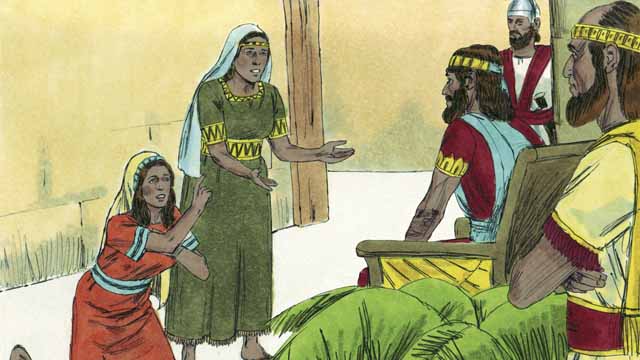
After many years, David died, and his son Solomon began to rule over Israel. God spoke to Solomon and asked him what he wanted most. When Solomon asked for wisdom, God was pleased and made him the wisest man in the world. Solomon learned many things and was a very wise judge. God also made him very wealthy.
大卫死后,所罗门开始统治。神对所罗门说话问他最想要什么。所罗门求要智慧,神甚是喜悦,叫他成为世上最有智慧的人。神也叫他很富有。
Important Terms:
* __[David](https://git.door43.org/Door43/en-tw/src/master/content/other/David.md)__
* __[Solomon](https://git.door43.org/Door43/en-tw/src/master/content/other/Solomon.md)__
* __[Israel](https://git.door43.org/Door43/en-tw/src/master/content/other/Israel.md)__
* __[God](https://git.door43.org/Door43/en-tw/src/master/content/kt/God.md)__
* __[wise](https://git.door43.org/Door43/en-tw/src/master/content/kt/wise.md)__
* __[judge](https://git.door43.org/Door43/en-tw/src/master/content/kt/judge.md)__
Translation Notes:
* __asked for wisdom__ - This could be translated as, "asked God to make him wise."
18-02
Solomon Built the Temple [18-02]
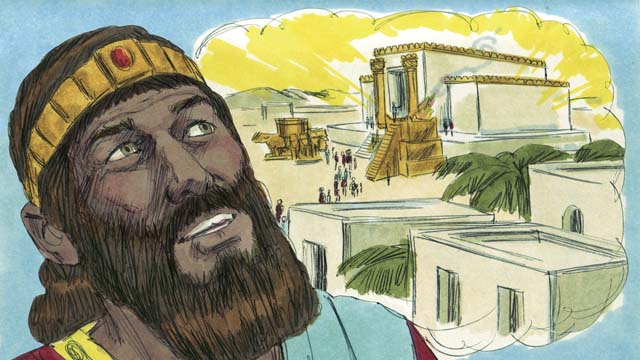
In Jerusalem, Solomon built the Temple for which his father David had planned and gathered materials. People now worshiped God and offered sacrifices to him at the Temple instead of at the Tent of Meeting. God came and was present in the Temple, and he lived there with his people.
在耶路撒冷,所罗门用他父亲大卫积攒的材料建造了他计划建的神殿。因此,百姓得以在殿里而不是会幕里敬拜和献祭。神住在殿里,与他的百姓同在。
Important Terms:
Translation Notes:
- was present in the Temple – That is, "was present in the Temple in a special way." Even though God was also present everywhere else at the same time, he made himself especially available to the people at the Temple.
- with his people - This could be translated as, "in the midst of his people" or, "among his people."
18-03
Solomon Served Other Gods [18-03]
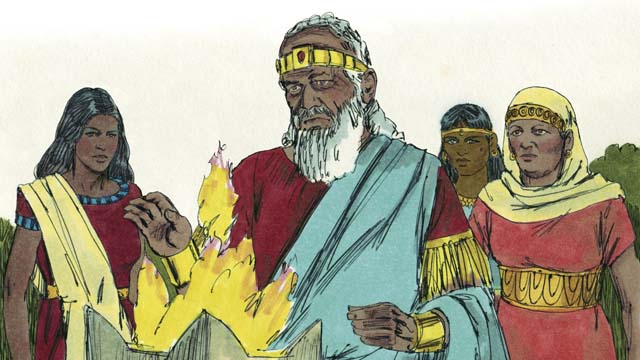
But Solomon loved women from other countries. He disobeyed God by marrying many women, almost 1,000 of them! Many of these women came from foreign countries and brought their gods with them and continued to worship them. When Solomon was old, he also worshiped their gods.
但是所罗门恋爱别国的女子,他违背神,娶了1000多个外邦女子。很多女子来自别的国家,来到以色列后就带来自己国家的神。所罗门年老的时候,就敬拜她们的神了。
Important Terms:
Translation Notes:
- brought their gods with them - They brought their idols and their methods of worshiping idols with them to Israel.
18-04
The Kingdom Would Divide [18-04]
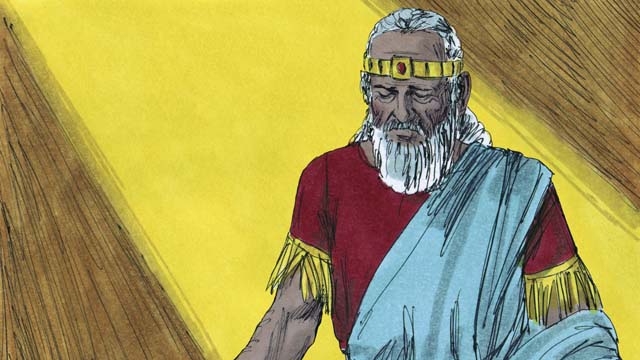
God was angry with Solomon and, as a punishment for Solomon’s unfaithfulness, he promised to divide the nation of Israel into two kingdoms after Solomon’s death.
神愤恨所罗门,作为他不忠的惩罚,叫以色列在所罗门死后一分为二。
Important Terms:
Translation Notes:
- as a punishment for Solomon's unfaithfulness, he promised to divide – This could be translated as, "to punish Solomon for being unfaithful to him, God solemnly said that he would divide."
18-05
Rehoboam Became King [18-05]
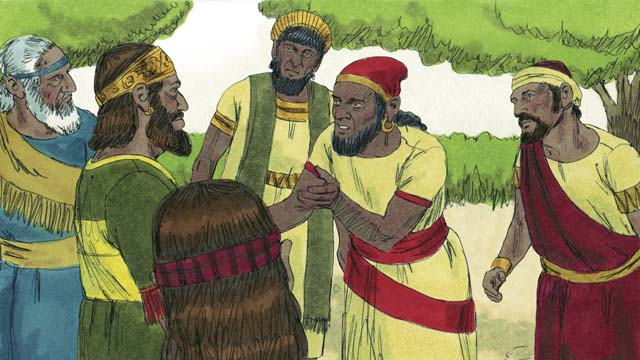
After Solomon died, his son, Rehoboam, became king. Rehoboam was a foolish man. All the people of the nation of Israel came together to confirm him as king. They complained to Rehoboam that Solomon had made them do a lot of hard work and pay a lot of taxes.
所罗门死后,他的儿子罗波安继承王位。罗波安是很愚昧的人。以色列人要立他做王。以色列抱怨所罗门让他们做苦工,赋重税。
Important Terms:
Translation Notes:
- confirm him as king - That is, "tell him that they were glad he was king and that they would do what he said."
18-06
Rehoboam's Foolish Answer [18-06]
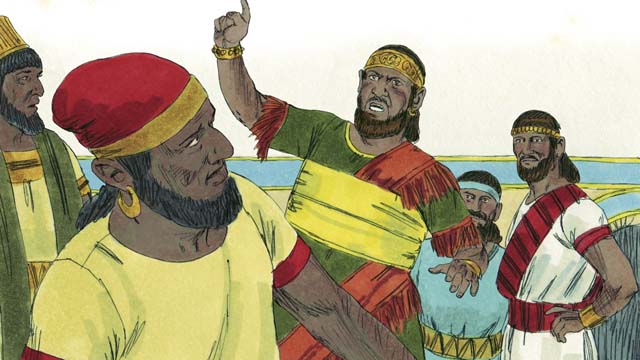
Rehoboam foolishly answered them, “You thought my father Solomon made you work hard, but I will make you work harder than he did, and I will punish you more harshly than he did.”
罗波安却愚蠢的说:”你们认为我父亲所罗门叫你们负重轭,我必使你们负更重的轭,我将要比他惩罚你更狠。
Important Terms:
Translation Notes:
- foolishly answered - Rehoboam's answer was harsh, and caused the people to turn against him.
18-07
Israel Rebelled against Judah [18-07]
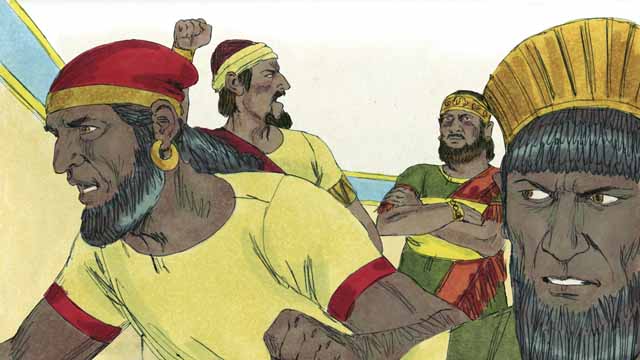
Ten of the tribes of the nation of Israel rebelled against Rehoboam. Only two tribes remained faithful to him. These two tribes became the kingdom of Judah.
以色列的十个部落起来反抗罗波安。只有两个部落还忠实于罗波安还。这两个部落就是犹大国。
Important Terms:
Translation Notes:
- tribes of the nation of Israel - The descendants of each of Jacob's twelve sons had become a "tribe" or very large family group in the nation of Israel. Everyone in Israel belonged to one of the twelve tribes.
- rebelled against Rehoboam – That is, "refused to follow Rehoboam as their king." It might help to start this sentence with, "So" or, "Because of that" or, "Because of what Rehoboam said."
- remained faithful to him – That is, "stayed loyal to him" or, "continued to support him as king."
18-08
Jeroboam Ruled Israel [18-08]
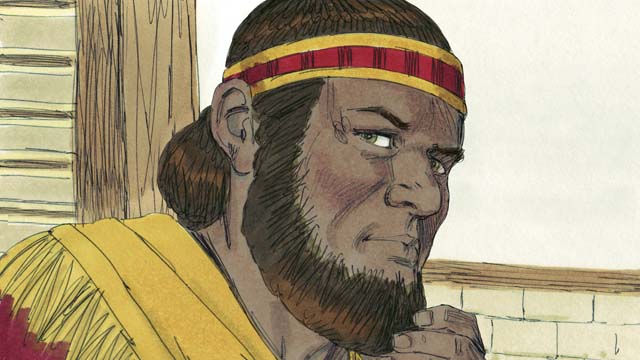
The other ten tribes of the nation of Israel that rebelled against Rehoboam appointed a man named Jeroboam to be their king. T__hey set up their kingdom__ in the northern part of the land and were called the kingdom of Israel.
另外反抗罗波安的十个部落推举一个叫耶罗波安的人做他们的王。这个国叫做以色列。
Important Terms:
Translation Notes:
- set up their kingdom - This may be translated as, they "established" or, "built" their kingdom. This sentence may also be translated as, "They separated themselves from the other two tribes and lived in the northern part of the land, and they called their country 'Israel.'"
18-09
Jeroboam Made an Idol [18-09]
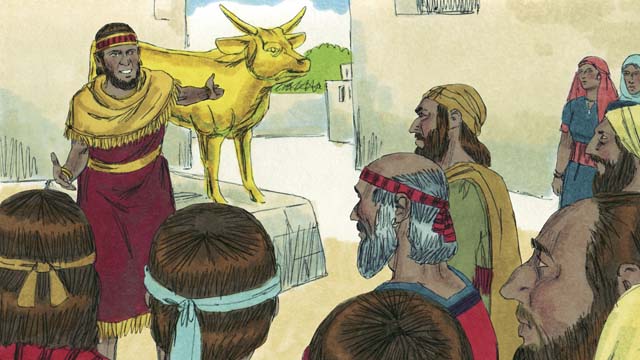
Jeroboam rebelled against God and caused the people to sin. He built two idols for his people to worship instead of worshiping God at the Temple in the kingdom of Judah.
罗波安悖逆神,使他的百姓犯罪。他造了两个金牛犊,叫百姓在犹大国的殿里敬拜金牛犊而不敬拜神。
Important Terms:
Translation Notes:
- caused the people to sin - This could be translated as, "led the people to sin" or, "motivated the people to sin." Rehoboam led the people into sin by making idols for them to worship.
- instead of worshiping God at…Judah - This can be translated as, "so that they would not worship God at" or, "instead of going to the kingdom of Judah to worship God at the Temple."
18-10
Israel and Judah at War [18-10]
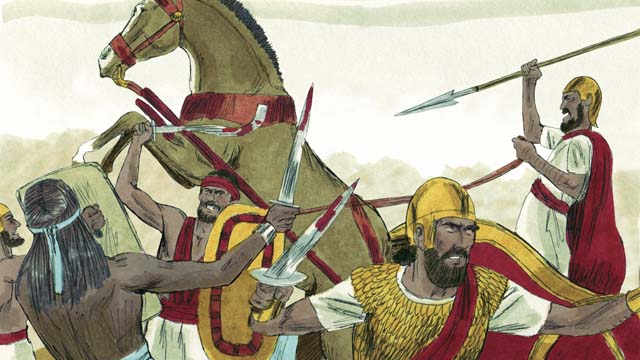
The kingdoms of Judah and Israel became enemies and often fought against each other.
犹大国和以色列国彼此对立还经常打战。
Important Terms:
Translation Notes:
- Judah and Israel - The people of Judah and Israel were all descendants of Jacob and part of God's people. Even so, they disobeyed God and fought and killed each other.
18-11
The Evil Kings of Israel [18-11]
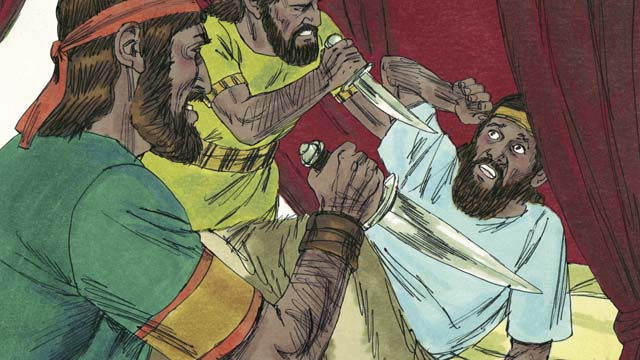
In the new kingdom of Israel, all the kings were evil. Many of these kings were killed by other Israelites who wanted to become king in their place.
在以色列国,所有的国王都是邪恶的。很多国王都是被想要登上王位的以色列人杀死的。
Important Terms:
Translation Notes:
- Israelites - Here, "Israelites" refers only to the people living in the northern kingdom of Israel, not to the people living in the southern kingdom of Judah.
18-12
Israel Worshiped Idols [18-12]
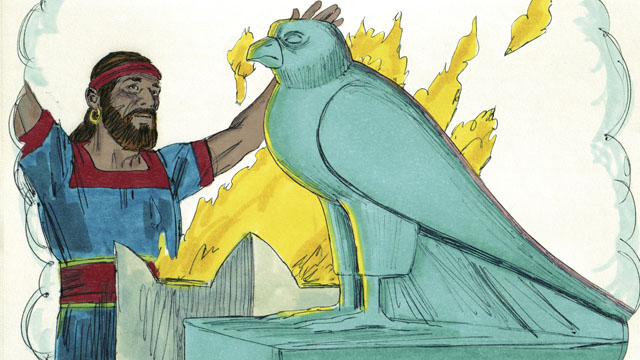
All of the kings and most of the people of the kingdom of Israel worshiped idols. Their idol worship often included sexual immorality and sometimes even child sacrifice.
所有的国王和一大部分百姓都拜偶像,还经常行淫甚至献童祭。
Important Terms:
Translation Notes:
- child sacrifice - They killed children as offerings to some of their idols.
18-13
Judah Was Unfaithful [18-13]
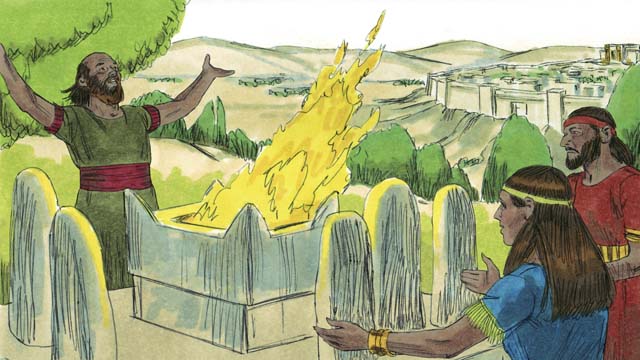
The kings of Judah were descendants of David. Some of these kings were good men who ruled justly and worshiped God. But most of Judah’s kings were evil, corrupt, and they worshiped idols. Some of the kings even sacrificed their children to false gods. Most of the people of Judah also rebelled against God and worshiped other gods.
犹大的国王是大卫的子孙。他们当中一部分是良善的用公义管理国家并敬拜神的国王。但是大部分国王都是邪恶、败坏、拜偶像的。一些国王甚至向假神献童祭。犹大的百姓也悖逆神拜其他神。
Important Terms:
Translation Notes:
- ruled justly - This means they ruled according to God's laws. This can be translated as, "when they ruled, they did what was right."
- corrupt - This can be translated as, "did what was wrong in order to get whatever they wanted."
- A Bible story from - These references may be slightly different in some Bible translations.
